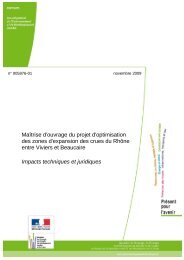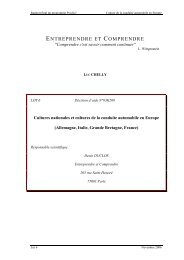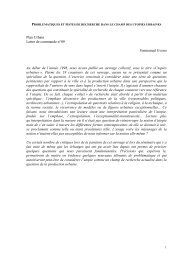des tic et des territoires - Portail documentaire du ministère de l ...
des tic et des territoires - Portail documentaire du ministère de l ...
des tic et des territoires - Portail documentaire du ministère de l ...
Create successful ePaper yourself
Turn your PDF publications into a flip-book with our unique Google optimized e-Paper software.
74<br />
Encadré n° 1 : Promesses, pratiques <strong>et</strong> problèmes <strong>du</strong> télétravail : le proj<strong>et</strong> eGap<br />
The eGap research project seeks to un<strong>de</strong>rstand the relative status of telework within small and mediumsized<br />
enterprises (SMEs), especially the factors that promote and inhibit its adoption and implementation.<br />
This work is being un<strong>de</strong>rtaken in five regions in Europe which are Rhône-Alpes (France), Emilia Romagna<br />
(Italy), Tampere (Finland), Central Transdanubia (Hungary) and the ‘Greater West London Wedge’ (UK).<br />
An earlier quantitative phase of the research involved at least 300 SMEs interviewed by telephone in each<br />
region. The qualitative phase reported on here builds on this earlier work through approximately sixty<br />
semi-structured interviews being con<strong>du</strong>cted in each region. The aim is to gain a greater un<strong>de</strong>rstanding of,<br />
inter alia, attitu<strong><strong>de</strong>s</strong> towards telework, implementation prac<strong>tic</strong>es of telework, and the enabling and<br />
inhibiting factors influencing its adoption.<br />
Fifty of these interviews were with owners/managers and employees of small firms. Issues addressed here<br />
were based on the following broad themes:<br />
1) preparations for implementation<br />
2) operational prac<strong>tic</strong>es<br />
3) corporate social responsibility<br />
4) enablers and inhibitors to adoption<br />
5) social infrastructural factors<br />
6) outputs and effects of telework<br />
A further ten interviews were con<strong>du</strong>cted with ‘other stakehol<strong>de</strong>rs’, such as regional policymakers and tra<strong>de</strong><br />
unions, and an additional subs<strong>et</strong> of questions were put to them in regard to their role in telework adoption.<br />
The findings from these regional analyses have been brought tog<strong>et</strong>her in an overview, “Transnational<br />
Report of the Qualitative Research Phase: A Comparative Analysis of Regional Findings”, submitted to the<br />
Commission in November 2003. Some of these findings are presented below.<br />
In terms of preparations for implementation, only the Hungarian partners pointed to structural<br />
<strong>de</strong>ficiencies in regard to ICT use, noting the “weak integration of ICT” into business processes of firms,<br />
and the “high price of Intern<strong>et</strong> use”. Otherwise technology for the most part was seen as an enabler to<br />
telework. With the possible exception of Italy and larger firms in Emilia Romagna, there was not much<br />
evi<strong>de</strong>nce for proactive <strong>de</strong>cision making by firms in the adoption of telework. Additionally there was very<br />
little evi<strong>de</strong>nce of proactively d<strong>et</strong>ermined training regimes for those teleworking in any of the partner<br />
regions. Firms did have training sessions for ICT use, though as the UK report observes, many of those<br />
teleworking had pre-existing skills that they brought to bear whilst operating remotely. The Hungarian<br />
partners are very cri<strong>tic</strong>al of training provision in Hungary in general, whilst at the same time implying that<br />
successful telework prac<strong>tic</strong>e is not a function solely of ICT skills. Generic skills such as ‘time management’<br />
are also attributes that teleworkers require. However, as the Italian authors observe, “entrepreneurs judge<br />
that the work carried out (at) long distance is the same as that done in the office”, a sentiment echoed by<br />
the Finns. Partners generally note that any training is ‘on the job’. The implication of this is that generic<br />
skills are not thought – at least in corporate training terms – to be requirements for successful teleworking.<br />
There are new SMEs that have seized opportunities to exploit the new ICTs and that practise telework<br />
perhaps in virtual enclaves (even if global in scope). According to the UK report, some of these new firms,<br />
“exhibited advanced use of technology by contemporary standards, and appeared comfortable working<br />
with, for example, ‘interactive whiteboards’ (by which documents can be seen and annotated by more than<br />
one user <strong>du</strong>ring a virtual dialogue) and audio or vi<strong>de</strong>o-conferencing”. Nevertheless, firms such as these are<br />
in a minority in the five regions.<br />
In operational terms, telework appears to be practised by a small minority of workers overall. Rather than the<br />
more radical approaches that proponents of virtual working would like, the adoption of teleworking, for the<br />
most part, appears incremental in approach, complementing existing work prac<strong>tic</strong>es rather than reconfiguring<br />
them. It became apparent that most teleworkers in SMEs across the five regions are managers, sales<br />
personnel and other specialist mobile workers who, in functional terms, have been working remotely since<br />
well before the Intern<strong>et</strong> arrived.<br />
Nevertheless, there is evi<strong>de</strong>nce too that telework is an un<strong>de</strong>r-reported phenomenon. Finnish, Italian and<br />
UK partners highlight the fact that the term ‘telework’ itself is problema<strong>tic</strong> in that some interviewees, who<br />
had originally stated that there was no teleworking in their firm at the start of interviews, after discussion<br />
changed their minds and <strong>de</strong>clared that there was. Further, the Finns note that some telework is intro<strong>du</strong>ced















